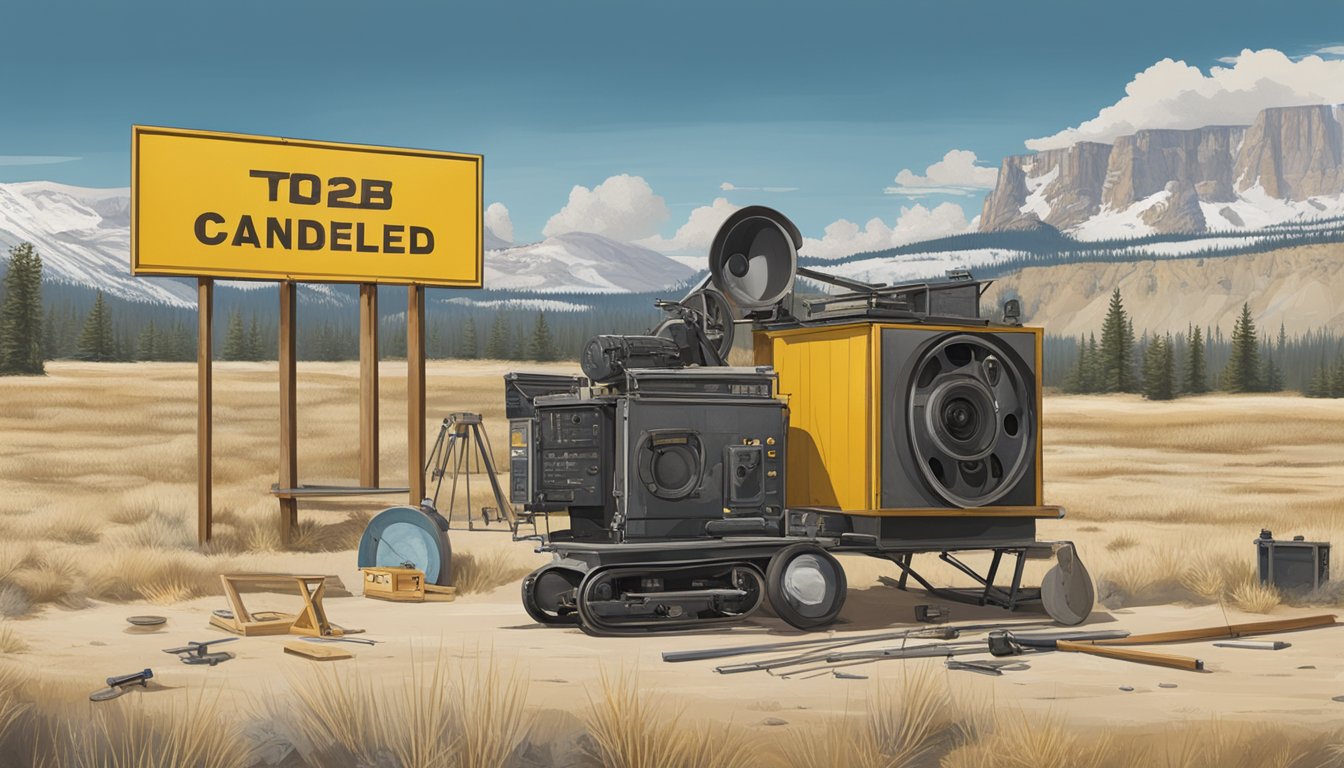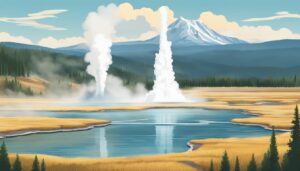The cancellation of “Yellowstone” after five seasons sent shockwaves through the television landscape. The popular Western drama, created by Taylor Sheridan and starring Kevin Costner, captivated audiences with its portrayal of the Dutton family‘s struggles to maintain control of their vast Montana ranch.
The show’s end was primarily due to scheduling conflicts with lead actor Kevin Costner. Paramount Network announced the decision in May 2023, citing difficulties in aligning production schedules with Costner’s other commitments. The actor reportedly requested to film his remaining scenes in a condensed timeframe, which proved challenging for the production team.
Despite its premature conclusion, “Yellowstone” left an indelible mark on television. The series garnered critical acclaim and a devoted fanbase, paving the way for spin-offs and cementing its place in the pantheon of modern Western dramas. While viewers expressed disappointment at the show’s cancellation, many looked forward to the announced sequel series set to continue the Dutton family saga.
The Success of Yellowstone

Yellowstone quickly became a cultural phenomenon, captivating audiences with its gripping portrayal of the Dutton family. The show’s success stemmed from its compelling storytelling, stellar performances, and exploration of contemporary Western themes.
Critical Acclaim and Awards
Yellowstone garnered widespread critical acclaim for its authentic depiction of modern ranch life. The series received multiple award nominations, including a Golden Globe nod for Kevin Costner’s portrayal of John Dutton.
Critics praised the show’s stunning cinematography and complex character development. The cast’s performances, particularly Costner’s as the Dutton patriarch, were consistently highlighted as standout elements.
Yellowstone’s success extended beyond critical recognition. The show achieved record-breaking viewership numbers for the Paramount Network, solidifying its status as a ratings powerhouse.
Cultural Impact and the Dutton Legacy
Yellowstone’s impact on popular culture was significant. The series sparked renewed interest in Western dramas and ranch life, influencing fashion trends and travel destinations.
The Dutton family became iconic figures, with their struggles and dynamics resonating with viewers across the country. John Dutton’s character, in particular, became a symbol of the modern American West.
The show’s popularity led to increased tourism in Montana, where it is set. Many fans sought to experience the landscapes and lifestyle depicted in the series firsthand.
Yellowstone’s success also paved the way for spin-off series, expanding the Dutton universe and further cementing its place in television history.
Factors Leading to Cancellation

The Yellowstone series faced several challenges that ultimately led to its cancellation after five seasons. These issues ranged from behind-the-scenes conflicts to financial considerations.
Contractual and Scheduling Disputes
Kevin Costner’s availability became a major point of contention. The actor reportedly requested to film his remaining season 5 scenes in just one week. This demand created significant scheduling difficulties for the production team and other cast members.
Paramount Network executives found themselves at odds with Costner’s limited time commitment. The dispute escalated, making it increasingly difficult to continue the show with its lead actor.
Costner’s contract negotiations also hit a roadblock. The studio and the star were unable to reach an agreement on compensation and filming schedules for future seasons.
Behind-the-Scenes Drama
Tensions rose between key players involved in the production. Reports suggested strained relationships between Costner and series creator Taylor Sheridan.
Creative differences emerged regarding the show’s direction. These disagreements made it challenging to maintain a cohesive vision for the series.
The Hollywood Reporter revealed that the on-set atmosphere had become increasingly tense. This negative environment affected the overall production quality and team morale.
Economic Considerations
Production costs for Yellowstone had risen significantly over its five-season run. The show’s elaborate Montana setting and star-studded cast contributed to its high budget.
Paramount Network and MTV Entertainment Studios faced pressure to manage expenses. The series’ financial demands became harder to justify as viewership plateaued.
Streaming rights complications added another layer of complexity. Peacock held exclusive streaming rights, limiting Paramount’s ability to fully capitalize on the show’s success on its own platforms.
The Producers Guild of America Awards recognized Yellowstone’s quality, but industry accolades alone couldn’t offset the mounting financial concerns.
Reactions to the Cancellation
The sudden cancellation of Yellowstone sparked widespread reactions across media outlets and among the show’s dedicated fanbase. News of the series ending after season 5 caught many by surprise, leading to extensive coverage and passionate responses from viewers.
Media Response
Deadline broke the news of Yellowstone’s cancellation, citing sources close to the production. The report triggered a flurry of coverage from entertainment news outlets. Entertainment Tonight featured interviews with cast members, who expressed shock at the decision. Puck News published an in-depth analysis of the factors leading to the show’s demise, including rumored conflicts between star Kevin Costner and the network.
Many media outlets speculated on the future of the Yellowstone franchise. Questions arose about potential spin-offs and the fate of ongoing storylines. Critics debated the impact of the cancellation on Paramount’s streaming strategy.
Fanbase Feedback
Yellowstone’s dedicated viewers reacted strongly to news of the cancellation. Social media platforms saw an outpouring of disappointment and anger from fans. Many expressed frustration at the abrupt ending, feeling the story was left unfinished.
Some fans launched online petitions calling for the show’s continuation. Others pledged to boycott Paramount over the decision. Fan forums buzzed with theories about behind-the-scenes drama and potential ways to save the series.
Not all reactions were negative. A subset of viewers felt the show had run its course and supported the decision to end on a high note. These fans expressed excitement for future projects from creator Taylor Sheridan.
Impact on Cast and Crew

The cancellation of Yellowstone has created ripple effects throughout the entertainment industry. Cast members face career transitions while crew members adapt to new production landscapes.
Future Endeavors of Key Figures
Kevin Costner, the show’s lead actor, has shifted focus to his Horizon film series. This Western saga allows Costner to showcase his skills as director, producer, writer, and actor.
Luke Grimes and Kelly Reilly are exploring new acting opportunities. Grimes has expressed interest in expanding his music career alongside acting pursuits.
Cole Hauser and Kelsey Asbille have garnered attention from other productions due to their breakout performances in Yellowstone.
Employment Shifts within the Industry
The end of Yellowstone has prompted a reshuffling of talent in Hollywood. Crew members with specialized Western production experience are in high demand for similar projects.
Set designers, costume experts, and location scouts from Yellowstone have found work on other period dramas and contemporary Western-themed shows.
Some crew members have transitioned to Yellowstone spin-offs, maintaining continuity in the franchise’s expanded universe.
The show’s success has also led to increased interest in Montana-based productions, creating new job opportunities for local film industry professionals.
Paramount’s Strategy Moving Forward

Paramount is pursuing an ambitious expansion of the Yellowstone universe through spinoffs and sequels while realigning its content strategy. This approach aims to capitalize on the franchise’s popularity and broaden its reach across platforms.
Development of Spinoffs and Sequels
Paramount is actively developing several Yellowstone spinoffs and a sequel series. The prequel 1883 has already found success, exploring the Dutton family’s early history. Other spinoffs in various stages of development include Tulsa King and the upcoming Horizon: An American Saga. These shows aim to expand the Yellowstone universe and attract new viewers while retaining existing fans.
The network has also announced plans for a sequel series that will continue the Dutton family saga where Yellowstone leaves off. This strategy allows Paramount to maintain the franchise’s momentum and keep audiences engaged with familiar characters and themes.
Realignment with Studio Objectives
Paramount is leveraging the Yellowstone brand to strengthen its streaming platform, Paramount+. By creating exclusive content tied to the franchise, the studio aims to drive subscriptions and viewer retention. This approach aligns with industry trends of using popular IPs to bolster streaming services.
The studio is also focusing on cost management and production efficiency. Reports suggest concerns over high production costs for Yellowstone and its spinoffs. Paramount is likely seeking ways to balance quality storytelling with sustainable budgets to ensure long-term profitability.
Critical acclaim remains a priority, with the studio eyeing prestigious awards like Emmys and Screen Actors Guild honors for its Yellowstone-related productions. This pursuit of critical recognition serves to elevate the franchise’s status and attract top talent for future projects.
The Legacy of Yellowstone Series
Yellowstone left an indelible mark on television, reshaping perceptions of modern Western dramas. The series captivated audiences with its portrayal of the Dutton family’s struggles to maintain control of their vast Montana ranch.
Influence on Contemporary Westerns
Yellowstone revitalized the Western genre for a new generation. Its gritty realism and complex characters set a new standard for storytelling. The show’s success inspired a wave of similar productions, proving that Westerns could resonate with modern viewers.
Yellowstone’s cinematography showcased Montana’s rugged beauty, sparking renewed interest in the American West. The series expertly blended traditional Western themes with contemporary issues, addressing land rights, political corruption, and family dynamics.
John Dutton III, portrayed by Kevin Costner, became an iconic figure in television. His role as the Montana Livestock Commissioner added authenticity to the show’s depiction of ranching life.
Preserving the Dutton Story
Despite its cancellation, Yellowstone’s legacy continues through its prequels. These spin-offs explore the Dutton family’s history, expanding the show’s universe and deepening fans’ connection to the characters.
The Yellowstone Dutton Ranch itself became a character in the series. Its sprawling landscapes and rustic buildings captured viewers’ imaginations, symbolizing the enduring spirit of the American frontier.
Yellowstone’s impact extends beyond entertainment. It sparked discussions about land conservation, Native American rights, and the changing face of the rural West. The show’s nuanced portrayal of these issues contributed to its cultural significance.
Season-Specific Breakdown

Season 5 of Yellowstone brought major developments for the Dutton family and their ranch. While fans eagerly anticipated a potential sixth season, the show’s cancellation left many questions unanswered about future storylines.
Highlights from Season 5
John Dutton’s ascension to governor of Montana marked a significant shift in the series. This new role put him at odds with his family’s interests and longtime adversaries. Beth Dutton continued her fierce protection of the family legacy, often clashing with Market Equities and other threats to their land.
Rip Wheeler’s relationship with Beth deepened, showcasing a softer side to his usually gruff demeanor. The bunkhouse crew faced new challenges, with tensions rising between longtime hands and newcomers. Jamie Dutton‘s complex relationship with his adoptive family reached a breaking point, leading to dramatic confrontations.
Potential Directions for Season 6
Had Yellowstone continued, Season 6 might have explored John Dutton’s struggle to balance his duties as governor with protecting his family’s interests. The show could have delved deeper into the environmental and political issues facing Montana ranchers.
Rip Wheeler’s leadership role at the ranch would likely have expanded, possibly leading to conflicts with other family members. Beth’s business acumen and ruthless tactics might have been tested against new, formidable opponents threatening the Dutton empire.
The series could have also explored the next generation of Duttons, focusing on Kayce and Monica’s son Tate and his potential future role in the family legacy.
Exploring Yellowstone’s Production Journey

Yellowstone’s production involved complex dynamics between key players and utilized diverse filming locations. The show’s creation required careful coordination of creative vision, budget considerations, and logistical planning.
Collaborative Dynamics
Taylor Sheridan, the creator of Yellowstone, worked closely with Paramount and 101 Studios to bring the series to life. Sheridan’s ambitious vision for the show led to significant production expenses, with episodes of related prequels costing up to $22 million each. This high-budget approach raised concerns among executives but also contributed to the show’s cinematic quality and popularity.
Paramount supported Sheridan’s creative endeavors despite the costs, recognizing the value of his work. The collaboration between Sheridan, Paramount, and 101 Studios played a crucial role in shaping Yellowstone’s distinct style and expansive storytelling.
Filming Schedule and Locations
Yellowstone’s filming schedule spanned multiple months each year, typically during the spring and summer. The show primarily filmed on location in Montana and Utah, capturing the breathtaking landscapes that became synonymous with the series.
The production faced challenges, including delays due to strikes by the Writers Guild of America and Screen Actors Guild. These interruptions impacted the filming timeline and contributed to scheduling conflicts, particularly affecting lead actor Kevin Costner’s availability.
Real ranches and rural properties served as key filming locations, adding authenticity to the show’s portrayal of ranch life. The demanding shooting schedule required cast and crew to spend extended periods on location, immersing themselves in the world of the Dutton family.



